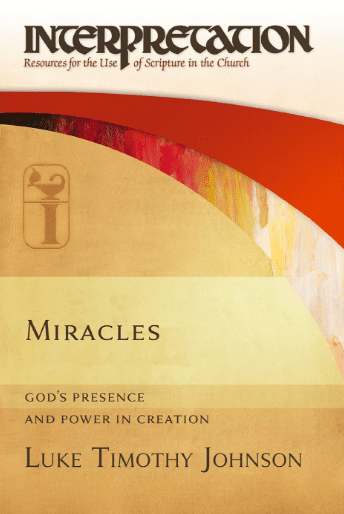 Luke Timothy Johnson connects — with theological force and accuracy — miracles to creation.
Luke Timothy Johnson connects — with theological force and accuracy — miracles to creation.
We are looking again at Luke Timothy Johnson’s new book on miracles, Miracles: God’s Presence and Power in Creation.
He finds four major themes if one begins with Genesis 1-3 to sketch a creation theology that leads to Israel’s and the church’s story:
First is the portrayal of God as one who speaks and by his word brings into being; the choice of the commanding word as the salient representation of God is both brilliant and consistent throughout the Bible. It imagines God as both transcending empirical reality and yet somehow immanent within it, as both “above’ what he makes and intimate “in” it.
The second aspect of the premise laid down by Genesis 1-3 pertains to God’s creatures. Although every other part of creation responds obediently to God’s commanding word, the creatures whom God made in his own image and likeness (Gen. 1:26) complicate God’s sovereignty because of their freedom to obey or disobey.
The third aspect of the premise laid down by Genesis is that God’s sovereign design for what he brings into being focuses less on individual humans—although the stories themselves are so crafted as to make us identify with the characters of Cain and Abraham and Jacob and Esau and Joseph—and more on the destiny of peoples and nations. Another way of putting this is that although the individual characters are caught up in the quotidian struggles of existence—Abraham s desire for an heir, Lot’s daughters desiring children, Isaac’s search for a wife, Jacob s struggle to get a wife and property together with his fear of his brother, Judah’s abuse of Tamar, the sons of Jacob revenging their sister Dinah together with their envy of their brother Joseph—the narrative suggests that God’s interests are larger.
Fourth, not only is the interplay of divine sovereignty and human freedom complex, but also God’s overarching intentions for his creation remain largely inscrutable to humans; only certain individuals, at certain moments, are given a glimpse—and that often is shadowed and obscure—of what God is up to. Humans do not come to a full or even partial understanding of the drama in which they find themselves involved, and certainly not on their own or as a result of analysis.
The big narrative of the Bible is the exodus (then exile and second exodus) and Johnson thinks we have to think of the exodus in terms of miracle (as he defines miracle). It is too easy to get lost in “can we prove it or not?” There are good reasons to embrace exodus as the real experience of Israel. Texts like Deut 26:5-11 and the appeal to exodus for self-understanding run deep in the Bible. So the sociological work of Gottwald or the cold water of modern skeptics that create a hermeneutics of suspicion are turned by Johnson into a hermeneutics of generosity/charity to embrace how the Bible talks about exodus.
What, then, do I propose as the experiential basis for this mythic narrative (bearing in mind the definition of myth and the discussion of its distinctive truth-telling mode in the previous chapter)? I suggest that it is the “miraculous” existence of the people itself. Israel could not but celebrate its very being and its very occupation of the land—leaving aside its stunning set of laws and its noble cult— as “God-given” rather than as an accomplishment that was within human capability alone. By comparison with the great empires of Egypt and Assyria to the west and the east, this tiny and fragile nation, always in danger of being overrun and destroyed, could only ascribe its “coming into being” and its continued existence among the nations to the God of Abraham, Isaac, and Jacob, who by calling them by name established them in the world.
Not all will be happy this because miracle and ability to prove miracle are tied closely together, so much so that inability to prove the miracle is tantamount to no miracle. He sees the miracle of exodus in the creation of a people beyond all expectations.
I have already stated my conviction that there were, in fact, some real bases for the people’s traditions; my point here is that the manner of Israel’s “coming into being” through God’s power is ultimately less significant than the existential reality of Israel’s coming into being “from nothing” by God’s power. You will notice that my language here closely parallels the language I used to express convictions concerning God’s creation of the world.
Is it true then?
The “truth” of the narrative lies in its success in communicating this single point: God is the source and goal of all that is, and Israel is the prime witness of God’s “miraculous” ability to bring into being that which did not exist.
If we grant that the entire narrative has a mythic character because it represents God as acting in the empirical world in a manner that intersects human agency, then we are free to inquire into the specific religious or moral point being made by the description of specific signs and wonders.











